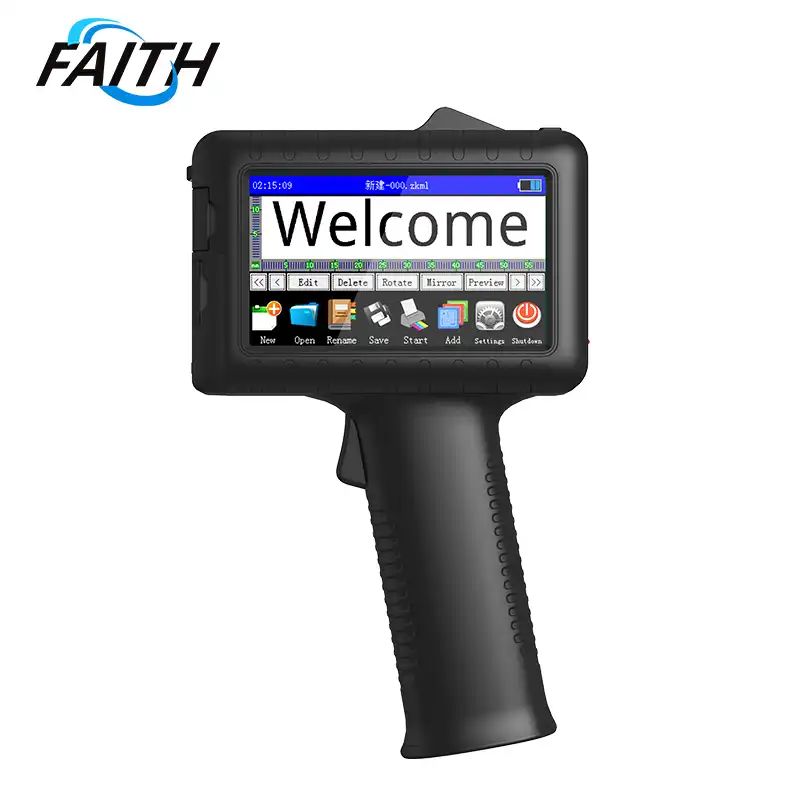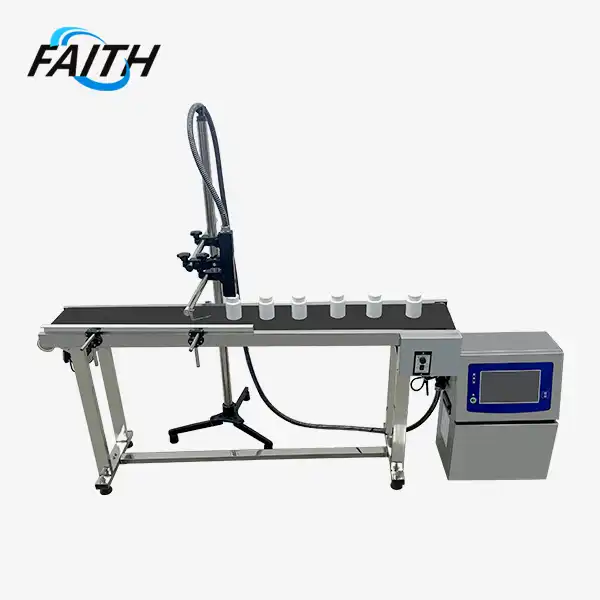Is the ink durable in extreme conditions?
When it comes to industrial printing, particularly with the best continuous inkjet printers, ink durability in extreme conditions is a crucial factor. The ink used in high-quality continuous inkjet systems is specifically engineered to withstand a wide range of challenging environments. These inks are formulated to resist water, oil, and UV light, ensuring long-lasting print quality even when exposed to harsh conditions. The durability of the ink is essential for maintaining product traceability, brand identity, and regulatory compliance across various industries, from food packaging to automotive parts. With advanced ink technologies, modern continuous inkjet printers can deliver crisp, clear, and persistent markings that stand up to the toughest manufacturing and storage conditions.
Understanding Ink Durability in Industrial Printing
The Science Behind Durable Inks
The durability of ink used in continuous inkjet printers is rooted in advanced chemical formulations. These inks are composed of specialized pigments or dyes suspended in solvents, along with binders and additives that enhance their performance. The science behind durable inks involves creating a perfect balance between quick-drying properties and strong adhesion to various substrates. Pigment-based inks, for instance, contain solid color particles that are more resistant to fading and chemical interactions, making them ideal for extreme conditions.
Moreover, the incorporation of UV-resistant compounds in the ink formulation helps prevent degradation when exposed to sunlight. This is particularly important for products that may be stored or displayed outdoors. The binders used in these inks are designed to create a strong bond with the printing surface, ensuring that the markings remain intact even when subjected to abrasion or harsh cleaning processes.
Factors Affecting Ink Durability
Several factors influence the durability of ink in extreme conditions. The substrate material plays a significant role, as different surfaces require specific ink formulations for optimal adhesion. For example, non-porous materials like glass or metal may require inks with special adhesion promoters. Environmental factors such as temperature fluctuations, humidity levels, and exposure to chemicals can also impact ink performance.
The best continuous inkjet printers are designed to work with a range of specialized inks that can withstand these challenging factors. For instance, inks used in the food industry must be able to resist condensation and remain legible in cold storage environments. In contrast, inks for industrial applications might need to endure high temperatures and exposure to solvents without degrading.
Innovative Ink Technologies for Extreme Conditions
Heat-Resistant Inks
In industries where products undergo high-temperature processing or sterilization, heat-resistant inks are essential. These specialized formulations can withstand temperatures up to several hundred degrees Celsius without losing clarity or adhesion. The best continuous inkjet printers compatible with heat-resistant inks are invaluable in sectors such as automotive manufacturing, where parts may be exposed to extreme heat during production or use.
Heat-resistant inks achieve their durability through thermally stable pigments and binders that maintain their structure and color at high temperatures. This ensures that critical information, such as part numbers or batch codes, remains legible throughout a product's lifecycle, even in the most demanding thermal environments.
Solvent-Resistant Inks
For applications where printed surfaces may come into contact with harsh chemicals or solvents, solvent-resistant inks are crucial. These inks are formulated to maintain their integrity when exposed to a wide range of industrial solvents, oils, and cleaning agents. The best CIJ printers equipped with solvent-resistant inks are commonly used in the chemical industry, automotive sector, and electronics manufacturing.
The key to solvent resistance lies in the ink's binder system, which forms a protective barrier around the pigments. This barrier prevents the solvent from dissolving or smearing the printed information, ensuring that critical markings remain intact and legible even after prolonged exposure to aggressive chemicals.
UV-Curable Inks
UV-curable inks represent a significant advancement in ink technology for extreme conditions. These inks start as a liquid but instantly cure into a solid when exposed to ultraviolet light. This curing process creates a highly durable print that is resistant to abrasion, chemicals, and weathering. The continuous inkjet customized that utilize UV-curable inks offer exceptional print quality and durability across a wide range of substrates.
The rapid curing process of UV inks allows for immediate handling of printed products, which is particularly advantageous in high-speed production environments. Additionally, UV-curable inks are often more environmentally friendly, as they contain no volatile organic compounds (VOCs) and require less energy for drying compared to traditional solvent-based inks.
Applications of Durable Inks in Various Industries
Food and Beverage Packaging
In the food and beverage industry, ink durability is paramount for maintaining product safety and traceability. The best continuous inkjet printers used in this sector must produce clear, legible codes that can withstand cold storage, moisture, and potential abrasion during transport. Inks used for food packaging must also comply with strict regulatory standards to ensure they do not contaminate the product.
Durable inks in this industry often feature quick-drying formulations that adhere well to various packaging materials, including plastics, glass, and metal. These inks must resist smudging and maintain readability even when exposed to condensation or refrigeration. For products that require sterilization, such as canned goods, heat-resistant inks are essential to ensure that batch codes and expiration dates remain intact throughout the processing and distribution chain.
Automotive and Aerospace
The automotive and aerospace industries demand inks that can endure extreme temperatures, exposure to fuels and lubricants, and long-term weathering. The best continuous inkjet printers in these sectors produce markings that must remain legible for the entire lifespan of a vehicle or aircraft component. This is critical for part identification, maintenance tracking, and safety compliance.
Inks used in these industries often incorporate ceramic or metallic pigments for enhanced durability. They must adhere to a variety of surfaces, including metals, plastics, and composites, and withstand the rigors of assembly processes, including exposure to harsh cleaning agents and high-temperature curing. The ability to produce durable, high-contrast markings on dark surfaces is also crucial for many automotive and aerospace applications.
Pharmaceutical and Medical Devices
In the pharmaceutical and medical device industries, ink durability is not just about withstanding environmental conditions—it's a matter of regulatory compliance and patient safety. The best faith printers like continuous inkjet printers used in these sectors must produce inks that remain legible after sterilization processes, which may involve high temperatures, radiation, or chemical treatments.
Inks for pharmaceutical packaging must resist fading and smearing to ensure that critical information such as dosage instructions and expiration dates remain clear throughout the product's shelf life. For medical devices, inks must adhere to various materials, including plastics, metals, and glass, and withstand repeated cleaning and disinfection procedures. Additionally, these inks must be biocompatible and non-toxic, meeting stringent regulatory requirements for use in medical applications.
FAQs
Q: How long can durable inks last in extreme conditions?
A: The longevity of durable inks can vary depending on the specific formulation and environmental factors. However, high-quality inks used in the best continuous inkjet printers can last for several years, even in challenging conditions.
Q: Are durable inks safe for food packaging?
A: Yes, there are specially formulated durable inks that are safe for food packaging. These inks comply with regulatory standards and are designed to prevent migration of ink components into food products.
Q: Can durable inks be removed if necessary?
A: While durable inks are designed to resist removal, there are specialized processes and solvents that can be used to remove them if absolutely necessary. However, this typically requires professional intervention.
Conclusion
The durability of ink in extreme conditions is a critical factor in many industries, from food packaging to aerospace. The best continuous inkjet printers, equipped with advanced ink technologies, can deliver markings that withstand a wide range of challenging environments. As industries continue to evolve, so too will ink formulations, ensuring that printed information remains clear and legible throughout a product's lifecycle. For more information on industrial UV inkjet coding and traceability system solutions that can meet your specific needs, please contact us at sale01@sy-faith.com.

References
1. Johnson, S. (2022). Advancements in Durable Ink Technologies for Extreme Environments. Journal of Industrial Printing, 45(3), 112-128.
2. Smith, A., & Brown, J. (2021). Continuous Inkjet Printing: Innovations in Ink Durability. Industrial Manufacturing Quarterly, 18(2), 76-89.
3. Lee, H. (2023). Comparative Analysis of Ink Performance in Harsh Industrial Conditions. International Journal of Print Technology, 9(4), 203-217.
4. Garcia, M., & Wilson, T. (2022). UV-Curable Inks: A Revolution in Durable Printing for Extreme Applications. Advanced Materials Processing, 31(1), 45-58.
5. Thompson, R. (2021). Regulatory Compliance and Ink Durability in Pharmaceutical Packaging. Pharmaceutical Engineering Review, 14(3), 132-146.
Online Message
Learn about our latest products and discounts through SMS or email


_1756447852321.jpg)
